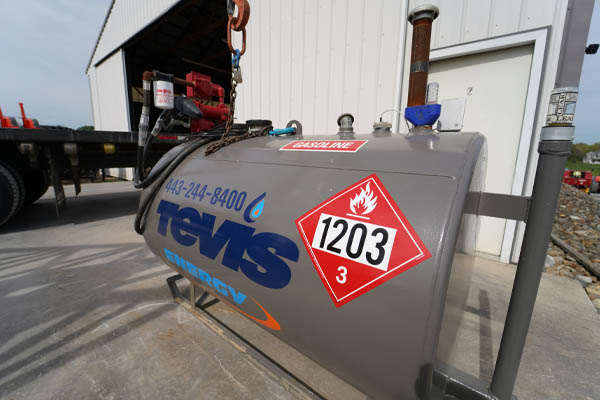Fuel storage is an integral component of many businesses, ensuring seamless operations, especially in sectors where fuel is a primary resource. Ensuring you have the right storage solution not only guarantees smooth operations but also emphasizes safety and cost-efficiency. This article delves deep into two leading commercial fuel storage solutions: skid tanks vs fuel cubes. This article helps businesses discern which is the best fit for their specific needs.
Top Commercial Fueling Options: Skid Tanks & Fuel Cubes
Keep reading to explore more on fuel cubes and skid tanks.
Related Article: 7 Industries That Use Bulk Fuel Delivery the Most
Understanding Skid Tanks

Skid tanks, as the name suggests, are large storage tanks designed to rest on skids, allowing them to be movable. Typically made of robust materials like steel, they are crafted to withstand the test of time and external pressures. A key feature of these tanks is their vast storage capacity, often making them a go-to choice for businesses with substantial fuel needs. The very design of skid tanks, streamlined and elongated, is emblematic of their intent: long-term, substantial storage that can be slightly adjusted in position if the need arises.
However, with their size comes the inevitable trade-off in space. They often require a dedicated space, mostly owing to their significant footprint. But their size and design don’t just offer storage; they also provide durability, often outlasting many other types of tanks, making them a cost-effective solution in the long run. This durability, coupled with their straightforward setup, makes them an attractive choice for businesses like large facilities, temporary construction sites, and power plants.
Exploring Fuel Cubes
On the other side of the spectrum, we have Fuel Cubes, compact, modular fuel storage solutions known for their versatility. They come with a unique selling proposition: the ability to be stacked, offering a modular solution to fuel storage. Their compactness doesn’t just serve businesses with limited space but also those that are on the move or have variable needs.
Constructed to minimize their footprint, they often come with enhanced safety features, ensuring reduced spill risks. While their individual storage might seem limited in comparison to skid tanks, their modularity offers a unique advantage. Instead of investing in a large tank, businesses can incrementally add cubes as their needs grow. This feature proves invaluable for mobile operations or enterprises that frequently relocate, like event companies or certain types of contractors.
Related Article: On-Road & Off-Road Diesel – What’s The Difference?
Key Considerations When Choosing Between Skid Tanks and Fuel Cubes
Determining the right fuel storage often comes down to introspection: understanding one’s business needs. Foremost is the storage capacity requirement. A large manufacturing unit with a consistent need will invariably tilt toward skid tanks. Contrast this with a seasonal business, like certain agricultural operations, and fuel cubes might emerge as the preferred choice.
Space is another pivotal factor. Urban businesses or those operating in space-constrained areas might find it challenging to accommodate skid tanks. Here, the compactness of fuel cubes, combined with their stackable nature, proves advantageous.
Budgetary considerations are always at the forefront of any business decision. While skid tanks might have a higher initial investment, their longevity often balances the scales. Fuel cubes, on the other hand, allow for a phased investment, adapting to the evolving needs of a business.
Lastly, but certainly not least, is the realm of safety and compliance. Both storage options come with their set of safety features, but the choice often boils down to the specific regulations and requirements of an industry or region.
Maintenance and Lifespan Of Commercial Fuel Storage Tanks
Maintenance plays a pivotal role in ensuring the longevity of your fuel storage solution. Skid tanks, with their robust construction, require periodic checks for corrosion or potential leak points. The good news is, with their simple design, spotting and addressing issues can be straightforward.
Fuel cubes demand a slightly different maintenance approach. Given their modular design, businesses must ensure the connectors and joints remain in prime condition. Regular cleaning, especially in a stacked configuration, ensures that no debris compromises the tank’s integrity.
When it comes to longevity, both options, if maintained well, can serve a business for years. Skid tanks, with their sturdy build, often see a longer lifespan, especially when placed in a stable environment. Fuel cubes, while robust in their own right, may require more frequent checks, especially if they’re moved regularly.
Related Article: 3 Reasons Fleets Should Swap the Gas Station for Mobile Fuel Delivery
Environmental Considerations & Technological Innovations
Environmental Impact & Safety Protocols
Both skid tanks and fuel cubes are designed with environmental safety in mind. However, the nature of their designs lends to different environmental considerations.
- Skid Tanks: Being larger and often stationed for longer periods, skid tanks come with in-built safety mechanisms to prevent leaks, which could be catastrophic given the volume of fuel they hold. Advanced skid tanks now incorporate double-walled designs and advanced leak detection systems. These designs not only prevent potential spills but also quickly alert operators should any anomalies arise. Furthermore, the placement of skid tanks often includes secondary containment measures, like diked areas, to contain any potential spills.
- Fuel Cubes: These modular systems, while smaller in individual capacity, still pose environmental concerns, especially when several are used in tandem. Their design advantageously allows for easy inspection. Many modern fuel cubes feature material and construction advancements that resist corrosion, thereby reducing the chances of leaks over time. Their stackable nature is also complemented by secure locking systems to ensure that even when stacked, there’s minimal risk of toppling or leaks.
Technological Innovations Of Skid Tanks Vs Fuel Cubes
The fuel storage industry, like many others, has benefited from technological advancements over the years.
- Skid Tanks: Modern skid tanks often come with automated fuel monitoring systems. These not only track the quantity of fuel but also monitor the quality, ensuring that any contaminants or water intrusion is quickly detected. Additionally, innovations like automated filling systems ensure that the tanks are never overfilled, thereby minimizing spill risks.
- Fuel Cubes: The modularity of fuel cubes has been enhanced with quick-connect systems, allowing businesses to easily increase or decrease their storage capacities as needed. Some advanced fuel cubes are also integrating smart monitoring systems, which provide real-time data on fuel levels, usage rates, and even predict when refills would be required based on consumption patterns.
Related Article: 7 Tips To Reduce Fleet Fuel Expenses
Other Considerations Of Skid Tanks Vs Fuel Cubes

The environmental and technological considerations go hand in hand when choosing a fuel storage solution. While both skid tanks and fuel cubes have evolved to be safer and more environmentally friendly, it’s the integration of technology that sets modern storage solutions apart. By investing in advanced systems, businesses not only ensure safety and compliance but also optimize their operations, making them more efficient and cost-effective.
Conclusion
In the end, the choice between skid tanks vs fuel cubes boils down to understanding one’s business deeply. Both storage solutions offer a range of benefits tailored to specific needs. It’s about aligning those benefits with operational demands, space constraints, and budgetary considerations. As always, emphasizing safety and regular maintenance ensures that whichever solution you opt for serves your business efficiently for years to come.
Related Article: Safety Tips For On-Site Fuel Storage Tanks
Contact Tevis Energy For Your Commercial Fuel Delivery Needs

Tevis Energy is a trustworthy HVAC company and fuel delivery company that services central Maryland and southern Pennsylvania. Our company offers affordable and the most competitive fuel prices in the area. Our goal is to provide you with excellent products and services. When you choose us to be your fleet fuel delivery supplier, you can rest easy knowing that you will have correct and prompt deliveries at the best possible prices. Furthermore, we offer various delivery plans and financing options, so you can customize your deliveries to meet your needs. Be sure to call us today to learn more.
Tevis Energy has certified and highly trained HVAC technicians to cater to all your heating and cooling needs. We guarantee that each of our techs has the experience, skills, and knowledge to provide excellent HVAC services. Our team can assist you with installations, repairs, maintenance, and much more. Our superior HVAC solutions always come at affordable costs. Click the link to view our service area.
Call us today to learn more about the products and services our company offers. We provide free, in-home estimates.
You can click here to contact us now or call us at (410) 876-6800 to find out more!
